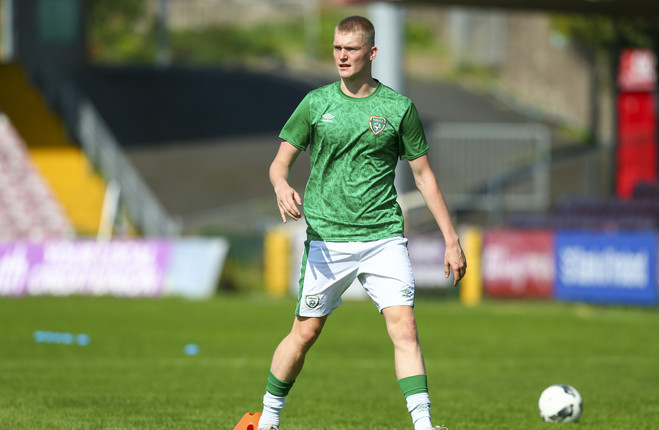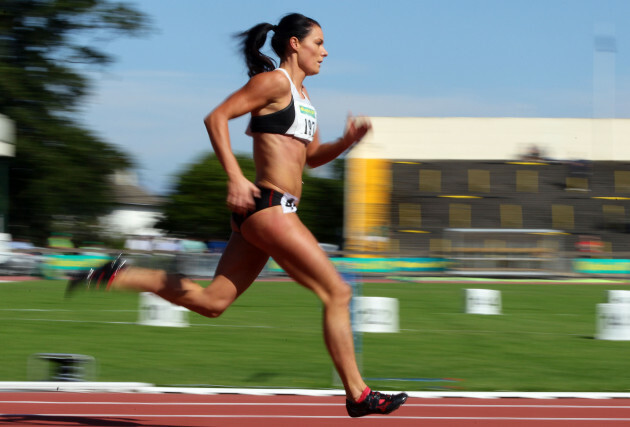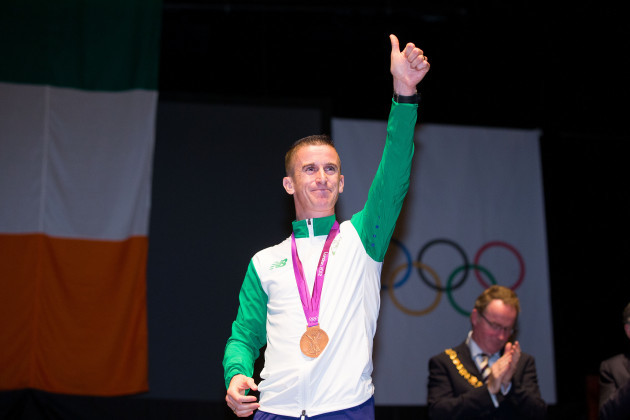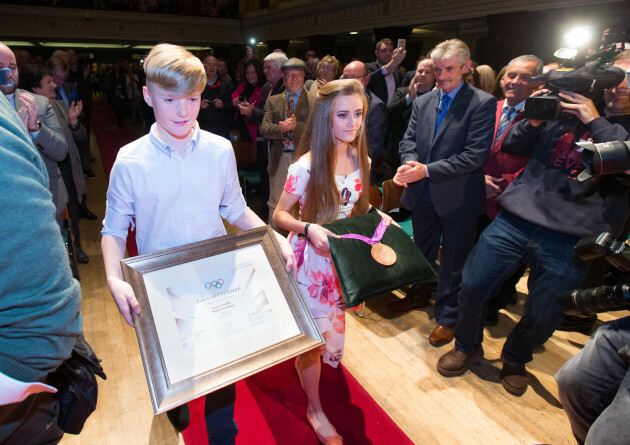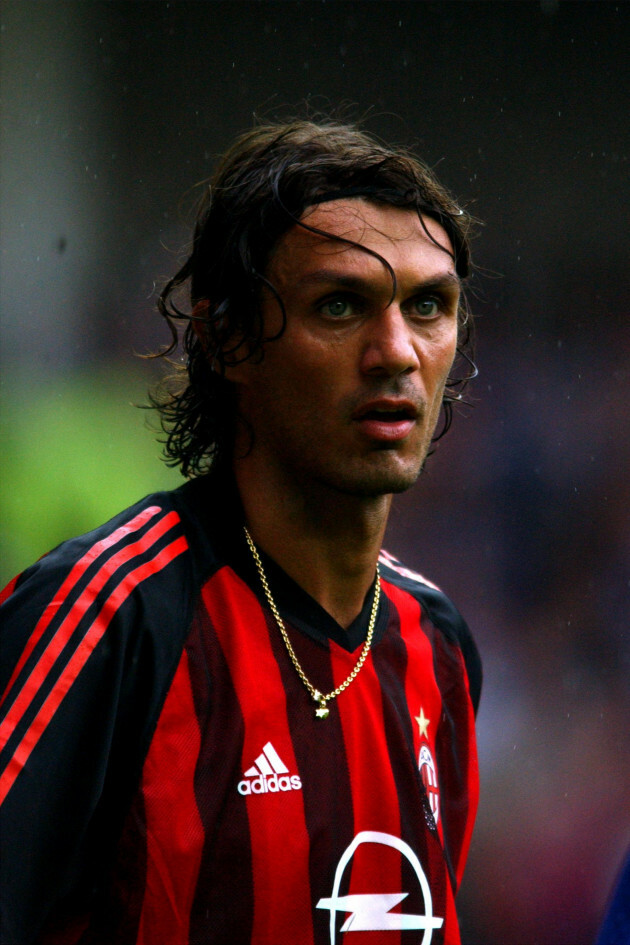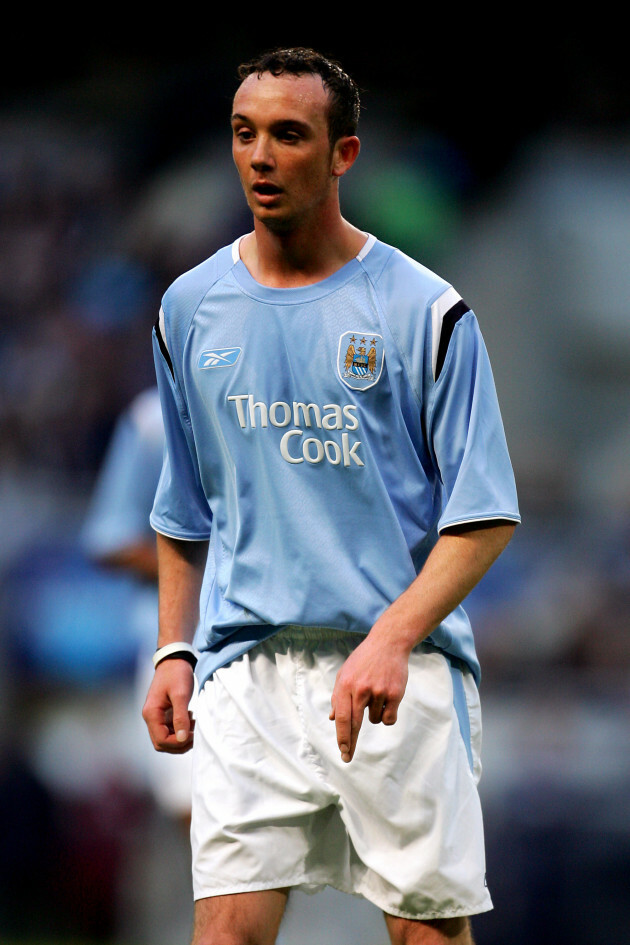BEHIND ALMOST EVERY successful footballer lies stories of numerous short-term failures and setbacks.
It has invariably been the case, from Roy Keane not making Irish underage teams to more modern examples like Harry Kane and Declan Rice being released by clubs at a young age.
Ireland U17 captain Cathal Heffernan, who recently joined AC Milan from Cork City on loan with a view to a permanent deal, knows he has a long way to go yet to make it in the game.
And at 16, despite completing a dream move on transfer deadline day last month, he has already experienced his fair share of setbacks.
The Cork-born starlet is the son of two Olympians, Rob and Marian Heffernan, and his mum emphasises that the disappointments and Cathal’s reaction to them, have been just as important a part of the journey as the successes.
It’s telling that when asked to single out her proudest moment so far, Marian picks out two incidents that would not ostensibly be regarded as happy memories.
“There have been a couple of games that he’s played shockingly in,” she tells The42. “[It's] the fact that he could go back out.
“[Ireland U17s] played Mexico last year and they had a double-header in the Cross [Turner's Cross]. The Mexicans were brilliant, came out with a completely different style of football, Cathal and [the team] were bamboozled. They were completely caught off guard. Then Cathal was freaked. He said ‘I had no idea what was going on, I was caught on the hop’. I said: ‘Cathal, you’re playing them again in two days, get your head right.’
“He was the captain and they came back out again and they upped it. I think he has that in him that he’s responsive and he understands [the importance of coping with setbacks].
“Another time, he was on a trial in England. [His agent] Stephen Ireland would have been there. And we would have been onto him when he was playing the match. It came down to this last match. The head fella in the club came in and was like: ‘Right, he plays well in this match and we’re signing him.’
“So he came off the pitch and he rang us and I asked: ‘How did you get on?’ He was like: ‘Yeah, I did well.’ I was slow to start alright, but I was unreal, I played some really good football.
“I was like: ‘Stephen Ireland was on the phone to me. He gave you a 4/10 for the first half and a 6/10 for the second half.’
He goes: ‘Alright, fair enough.’
“I said: ‘That’s 50% Cathal. Do you think you’re going to be offered something [based on that]?’
“He was like: ‘Oh yeah, I suppose.’
“Stephen is very honest. Cathal doesn’t get offended by it. The feedback is there for him to get better. So he doesn’t go back into his shell with this. He thrives on it.
“Even with the Mexico game out in the Cross, he learned. I was like: ‘Right, you’re putting something into action for next time.’
“The trial in England, at that level, just because he’s held his own [it's not enough], they’re looking for more. You nearly have to show off. You have to show that extra 10%, even if the rest of the team are after dropping. You need to show the best version of yourself. He learns from that, or he understands it.”
Finally it’s official. So proud of you Cathal this is only the beginning ❤️ Now it’s time to work #teamheff #driveon pic.twitter.com/gLRkm2jKTU
— Rob Heffernan OLY (@RM_Heffernan) January 31, 2022
Marian is keen to emphasise, however, that not every young footballer should necessarily be treated this way. While Cathal desires feedback, no matter how critical, others can take it the wrong way.
“There’s a fine line. There’s knowing the player and knowing the person. Cathal would respond, but if you say that to another kid, he could completely break down.”
***
Relief was the overriding feeling when Cathal’s move to AC Milan was finally confirmed. Marian admits it is unlikely to have happened were it not for the ramifications of Brexit and the new ruling whereby British clubs are unable to sign Irish players under the age of 18.
There was also some typical deadline day chaos — at one point late on in the process, it looked as if the deal was off, but negotiations ultimately recommenced and they got the signing over the line just in time.
“Obviously, I was sad to see him go, but I would have been completely distraught had it fell through,” says Marian.
“Knowing the work he’s put in — this has been nearly two years in the making. He’s been trialling since he was nearly 14.
“He’s gone into really big clubs like Man United, Celtic, Leicester.
“All of those experiences brought him here. Obviously, with Brexit, there was a lot of interest prior to this decision being made that they weren’t going to bring kids over until they were 18 from Ireland.
“AC Milan being such a big club was the icing on the cake. For us, the last two years, we just wanted him to get in. Even if it was Cork City or another club in Ireland, we just wanted him to settle and be able to work.
“Inevitably, he wants to do this as a profession long term. But there’s a pathway there for us as parents, knowing sport and knowing the environment that he needs to take the next step.”
Both Rob and Marian are in Milan this weekend to watch Cathal play an underage match, while they previously took in the facilities at the club.
“We went there, saw the lay of the land and we’ve obviously come from a sporting background. It’s very basic. You’re in a centre where there are Astro pitches, normal pitches, gyms, treatment rooms, and it just simplifies it. The sports life is very simple.”
Cathal and those around him recognise that signing for Milan is only the beginning rather than the culmination of a journey, nonetheless having experienced rejection from high-profile teams in the past, it felt like a major step.
“He went into a couple of trials and he was just told ‘no’. He had no match practise going into the season. We had to say to Cathal, you’re going into these clubs, they’re training, you’re not. So you need to be that little bit more switched on. He went into one club and he was given feedback. It was like ‘no, he is really good at tackling or whatever, but he’s slow to turn, he needs to be quicker’. That was in November and then January, he went into another club and got the exact same feedback.
“From a training and high-performance perspective, I said: ‘Cathal, they’re looking for something. You had that feedback in November and you’ve done nothing to counter it. It’s not going to change if you don’t work on it.’
“It’s awful getting rejected and it does affect him, but it’s nothing personal. They want you to be in their team and they want you to do a certain job in your position and if they’re doubting you any little bit, you need to show the next time that you’ve worked on it and you’re able to do it and you can learn.’
“It’s an opinion. But do you know what? Cathal would have got rejected from a good few clubs that he went into, but even now that he’s got accepted by AC Milan, he’s still very level.”
Marian and Rob are constantly challenging Cathal to be the best he can be, but they see the question of whether he ultimately makes it as a professional footballer as besides the point in some ways.
“If you never got offered a contract, that’s a lesson you have to learn for the rest of your life in any capacity or job you do. So for us, it was never about him making it as a soccer player. Obviously, we want him to have a high-performance mindset but specifically going into high-performance, there are tiers you have to go through, skills you have to have, there’s a certain level you have to be. To play in these clubs, you have to go on trial. You’ve got feedback from some of the best players and coaches on the planet, use it.
“He’s learned from his setbacks and he’s learned from the rejection. He was trialling in Germany [with Bayer Leverkusen] as well and he’s really good at taking the emotional side out of it.
“They did 30m speed gate tests on him. Cathal came back and said I’m after doing 4. whatever seconds. I said ‘that’s brilliant, fair play’. I sent him on the levels: ‘Do you know that means you’re at a really good level?’ Then he was boasting saying he was quick. I said: ‘Cathal, that’s my time over 60 and I wasn’t a fast runner.’ You’re way faster than me, I said, but there’s a massive margin for improvement here. He kind of went: ‘Alright.’
“Obviously I sprinted, but I can pull stuff back and go: ‘No, Cathal, you’re good, but you’re a man, you should be a lot quicker.’ These are the margins you should be looking at and it simplifies it for him.”
Marian continues: “We asked what the standard was like [at Milan]. He said: ‘Do you know what? It’s not that far beyond what we have at home.’ He said that about a couple of the big clubs that he went to. They’re not that special. It’s just that they’re in an environment where they’re training five days a week as opposed to being back home and you might have three days a week plus a match. That extra day or two days training over years does have a massive impact on development.”
***
Cathal has already made friends with some of his peers over in Milan. In addition, plenty of work has been put into ensuring he has the best support possible at the club.
A tutor gives him daily hour-long Italian lessons. He is attending an English-speaking school where he will study his core subjects from 8.30am to 12.30pm on weekdays, before training, which takes place from 3pm to 6pm.
Of course, the Heffernans’ house in Cork feels a little bit emptier but it is not an entirely new experience for them.
“Because it’s so close, we’re not missing him too much. During the pandemic, Stephen goes: ‘Look, get him over to me.’ [It was supposed to be] training for the week, and Cathal ended up staying there for five weeks. He just loved it so much. So we’re kind of used to it with the trials. Even in the Irish camps, he could be gone for a week and he’s involved in two age groups, so that’s double the time away from home.”
Marian continues: “If he was feeling homesick, he’d confide in us, he’d always pick up the phone. With Skype, WhatsApp and Facebook, you’re never too far away. He has nice friends and they’re in contact with him. I told him this morning that we were heading over [to Italy] on Saturday and he goes: ‘I told you, let me settle in a few weeks before you come over.’
“So he’s not too bothered that we’re not there. I think Cathal would gladly put the head down for weeks because he’s just so happy he’s got this opportunity.”
***
With Marian having competed at the Olympics and Rob even winning a bronze medal in the 50km walk at London 2012, the more obvious route for Cathal to take would have been athletics and he did compete in a variety of sports as a youngster.
“He was with a running club from the time he was six up until he was nine, and he was a really good runner,” Marian recalls. “He had lots of friends in school that were joining the soccer club and the hurling club, so he just went into everything and he was very good at all of them. So he developed from where his friends were. Hurling season, he went to the hurling club and there was a nice group of them there. When the soccer season kicked off, everybody was then drawn to that. So he gave up running when he was nine. He got more enjoyment from going into the team sports and just having that buzz.
“He would have been factored in with all the school teams, he was playing three age groups, with Gaelic football, soccer and two or three for hurling at one stage.
“The year he was 12, we counted up, he played 104 games. He played a U12/13 final, played it one after the other, so it was 30 minutes [per half in the first game] but it went into extra time and then the next match, he played the full game, and that went into extra-time, so he was playing soccer for nearly three hours long. He was wrecked.
“So he would have been really good and he was picked up by Cork schoolboys and then Cork City came in, so there was a natural progression and he’s been lucky to have some really good coaches that within reason, would have moved him up in age group when they thought he was ready. So he responded to each challenge and the coaches that looked after him did have faith in him.”
Yes I am one of those parents now 😂 #prouddad #lovesport #COYGIG pic.twitter.com/zIt8V6VolQ
— Rob Heffernan OLY (@RM_Heffernan) June 10, 2021
Cathal is not the only talented Heffernan youngster looking to emulate the sporting success of their parents.
His sister Meghan is also an Ireland underage international and is attempting to break into the Cork City senior women’s panel while balancing an exercise science degree at Waterford Institute of Technology.
There are also two younger members of the family, Tara and Regan.
“[Regan is] about 10 hours a week in gymnastics and she plays soccer, camogie, Gaelic football.
“But it was the same with Cathal at that age, they love it, they love the interaction with the kids.”
Having two former elite athletes as parents does not guarantee similar success, of course, but it certainly helps.
“Obviously, Rob is coaching people [in racewalking] at the minute now. Even during the lockdown, Cathal would have gone out and helped Rob’s lads with their sessions. So they understand the sessions being important and that.
“I think the soccer lifestyle and developing yourself as an individual within a team, you’re obviously trying to make the team better but having that individual mindset, Cathal needs to know where his strengths and weaknesses are and how he’s going to work on it externally. I think he’s got that from us and we’ve instilled that in him all the time.
“With soccer, it’s an opinion and you kind of have to teach Cathal, it’s not personal. It’s just, you might not fit that team. But you still need to grow and get better regardless of whether somebody thinks you’re good or not. Your development and your wanting to kick on are going to make you get better. If something comes of it, it comes of it. If Cork City or St Pat’s is your level, you need to be happy to work at that level as well.
“Cathal is in a good position now but if he is to come home and in a year’s time, he has to be happy if Cork City is where he’s going to be. [It's important that] the next two years, he wants to kick on just as well as if he was at Manchester United, Celtic or wherever.”
***
At Milan, Cathal will be in the vicinity of some of the biggest names in football. Zlatan Ibrahimović is the most famous player in the first team, but the squad is filled with talented stars, such as Olivier Giroud, Sandro Tonali and Franck Kessié.
Widely regarded as one of the best to ever play the game at the back, Paolo Maldini is currently serving as technical director for Milan and is tasked with overseeing the progress of all the defenders on the books at the club.
“It’s just brilliant that these kinds of players are coming back into sport [after retirement from playing],” Marian adds.
“The art of defending in the way that the Italians do, it’s probably the best place in the world to learn to defend and for a defender to be.”
An interesting subplot to Cathal’s story, meanwhile, is the prominent role that Stephen Ireland has played in his development.
The former Ireland international had a fundamental role in the negotiating process that ultimately resulted in the young defender’s big move.
“Stephen would have done most of it. But obviously, he would have bounced stuff off us and he wouldn’t take control 100%. He would always revert back and say: ‘Are you happy with this?’
“Even in Leverkusen, when Cathal was on trial over there, AC Milan were like: ‘We want you to sign now.’ We had to make a decision. We said to Stephen: ‘Look, they have to respect the fact that we have committed [to the other trial]. Cathal was in Germany in December and they said: ‘We want him back in January again for another trial.’ We accepted. So I said we can’t go over and pull the plug on this trial. And they’ve kept the communication open so we had to honour that as well. So with those kinds of decisions, Stephen wouldn’t go off the cuff and say: ‘He needs to end this trial and go to Milan.’ We’ve been very much involved in the decision-making.
“He works with an agent in Europe — one in Germany and one in Italy. They kind of interact and the Italian agent then would work with the Italian clubs. That’s why it can get so messy towards the end. There are just too many voices at a time where you have to cross the T’s and dot the I’s. It’s when the agents just need to stand back and just leave the clubs to negotiate and take the talk away and get down to the business end of it.”
Ireland himself was unquestionably one of the most talented Irish players of his generation and at his peak, was a key player for Manchester City. However, a mixture of injuries, bad luck and ill-advised decisions meant his career at the top level petered out prematurely.
The 35-year-old has since spoken of the lack of support offered to him as a young footballer and how it hurt his career. And now, working as an agent, there is a sense of Ireland trying to right some of the wrongs that impacted him, ensuring Cathal and other youngsters on his watch do not suffer similar problems.
Marian explains: “For what Stephen felt he lacked when he was growing up, he’s trying to give now and give back to kids to see can they break in and get into a pathway where they can kick on and make a career out of it.
“In the soccer world, there are so many people with an opinion. There were plenty of people to give [Cathal] advice, but nobody with the proper advice. Soccer is obviously among the most popular sports in the world, and a player at that standard would never be short of someone to talk to.
“But again, you do need strong people around you. Especially at that level, people that will be there for you that are going to give the best advice for you. At that level, there’s more to it than football.
“I think, for Stephen, if he could have been directed better, his career could have been completely different, and he did brilliantly [regardless].
“He’d have been one of our most talented players, but he was just unlucky in the sense that a few things didn’t go 100% for him. That’s what he’s trying to give back or simplify for the players now that he’s looking after.”
The feedback Cathal has received from Ireland and others has been vital and continues to be, Marian adds.
“Parents can be at fault as well, saying: ‘You’re brilliant, you’re brilliant.’ That’s not good for the kid, especially if they are playing at a high level of sport or they want to play there. Being told ‘you’re great’ when there are other factors they could be working on can kind of hinder kids as well.
“Just being honest [is important]. Cathal is not the finished product by a long shot. He’s done brilliantly for where he’s at. But I think he is only working off 40% of what he can actually do. I’ve said that to him. But it’s him understanding it is the thing.”
